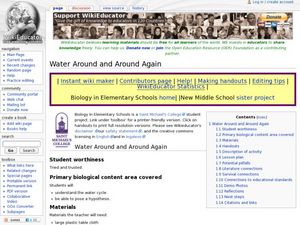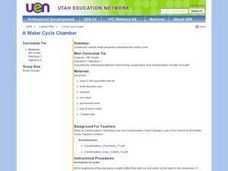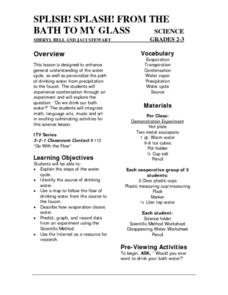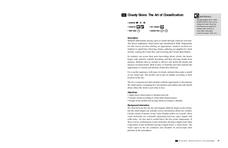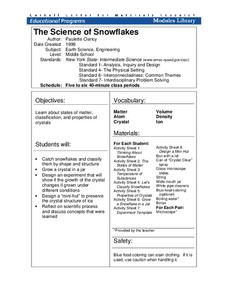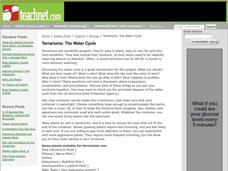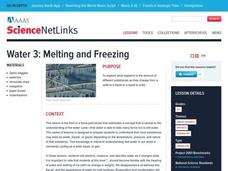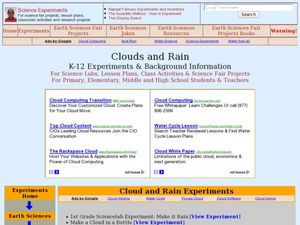Curated OER
Water Around and Around Again
Students form a hypothesis for a water cycle experiment. In this water cycle instructional activity, students create their own environment with water and earth to study the water cycle. Students complete a handout to make a hypothesis...
Curated OER
A Water Cycle Chamber
Fourth graders are shown the water cycle by watching a demonstration by their teacher. In groups, they are given one two-liter bottle with a starter hole and follow instructions to complete the set up. They place ice cubes into the...
Curated OER
Splish! Splash! From the Bath to my Glass
An excellent instructional activity on the water cycle! In it, learners should gain a general understanding of the water cycle, along with how water first falls as precipitation, then ends up coming out of our faucets. This instructional...
Curated OER
Water Cycle Stories
Students explore the water cycle and associated phase changes. They predict what happens to the mass of an ice cube in a Ziploc bag, discuss and act out phase changes and diagram the water cycle.
Bekshire Museum
Cloudy Skies: The Art of Classification
Such a great resource and perfect for learners in Kindergarten through third grade. The class will discuss cloud types and formation, and then they'll get outside and draw as they observe the clouds they see. They'll need to take note of...
Curated OER
The Earth's Atmosphere and Temperature
Students describe and compare the layers of the atmosphere. They explain how to measure the temperature of the atmosphere and discover what causes the atmosphere to heat up in some places more than in others.
Science Friday
Sublime Sublimation
Dry ice isn't dehydrated water, and young scientists learn why in this fascinating presentation. After watching a video, they complete three different activities using dry ice. Upon completion, they discuss the scientific principle.
Cornell University
The Science of Snowflakes
Who can grow the best crystals? Challenge class members to develop strategies for enhancing growth in the crystals. Through a lab investigation, learners study the properties of crystals and test the effectiveness of different growth...
Chymist
Esters: An Introduction to Organic Chemistry Reactions
Scratch and sniff an introduction to organic chemical reactions. A creative lesson has individuals study the esters commonly used in scratch-and-sniff stickers and advertisements. Following the lab procedure, scholars create the organic...
Cornell University
Optical Simulation of a Transmission Electron Microscope
Don't have an electron microscope? Have your classes build the next best thing! A hands-on lesson asks scholars to build a model of Transmission Electron Microscope (TEM). They then use their models to identify the function of each...
North Carolina Consortium for Middle East Studies
Missing Pieces of the Puzzle: African Americans in Revolutionary Times
What's missing from most studies of the American Revolutionary War is information about the role African Americans played in the conflict. To correct this oversight, middle schoolers research groups like the Black Loyalists and Black...
Curated OER
The Sun as the Driving Force of the Water Cycle
Students study the water cycle and how the sun is an important factor. In this water cycle lesson students investigate how to desalinate water and explore the different densities of fresh versus saltwater.
Curated OER
Tornado
Students study the classification system of tornadoes. For this tornado lesson students make their own tornadoes in different mediums.
Curated OER
Exploring Meteorite Mysteries: Building Blocks of Planets
Students simulate the formation of chondrites and asteroids. In this astronomy lesson, students demonstrate accretion using balloons and static electricity. They compare and contrast their models to the actual process of chondrites and...
Curated OER
The Water Cycle
Students create terrariums in containers in order to study the Water Cycle. They examine how the terrarium maintains life in the closed environment.
Curated OER
Water Cycle in a Box
Fourth graders investigate how the water cycle is vital for all living things to survive on Earth. They observe the teacher set up a simulation of the water cycle using a Plastic Earth Simulator, desk lamp, and water, and make...
Curated OER
How Do We Spend, Save, and Donate?: Penny Drive
Students explore the power of money. In this philanthropy instructional activity, students investigate how money is used in society. Students record data regarding money patterns on graphic organizers.
Curated OER
Water, Water, Everywhere!
Students complete a WebQuest. In this water cycle lesson, students investigate the cycle through a WebQuest activity. Students research the water cycle through Internet resources and create a documentary video of their process.
Curated OER
Melting and Freezing
Students explore how various substances change from a solid to a liquid or from a liquid to a solid and how temperature, pressure and nature play an important role in this process. In this melting and freezing lesson, students review the...
Curated OER
States of Matter
Learners explore the states of water. In this physical science lesson, students use ice and dry ice to observe the changes in the state of matter. Learners record the results.
Curated OER
Clouds and Rain
Students study how clouds form, what different types there are and what rain is. In this atmospheric lesson students make a cloud and create evaporation.
Curated OER
How Do Clouds Form?
Students describe how they believe clouds form. They observe the different types of clouds they see and identify the types. They examine what affects the size and shape of clouds.
Curated OER
What's the Matter? Where Did it Go?
Eighth graders analyze questions posted on a large poster in the room and work in groups to record their response to the question on paper, rotating to the next question after two minutes have passed. They review the characteristics of...
Curated OER
The Water Cycle
Fifth graders examine the stages of the continuous water cycle that exists on Earth. They observe a water cycle model that is set up in the classroom and write descriptions of what they see. As a class, they discuss models of the water...


